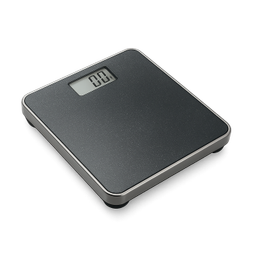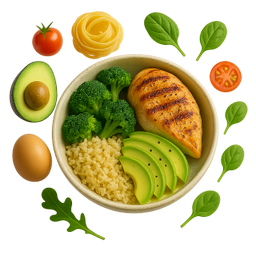
Understanding Micronutrients: The Essential Vitamins and Minerals Your Body Needs Daily
Complete guide to essential vitamins and minerals: what they do, how much you need, and the best food sources to meet your daily micronutrient requirements.
Verdu Team
The team behind Verdu, your AI-powered nutrition companion
You've probably heard that you need to eat your vegetables and get enough protein. But when was the last time you thought about whether you're getting enough vitamin K? Or magnesium? Or selenium?
Here's the thing: while macronutrients (protein, carbs, and fats) get most of the attention in nutrition conversations, micronutrients—the vitamins and minerals your body needs in smaller amounts—are just as critical for your health. They power everything from energy production and immune function to bone strength and blood clotting.
The challenge? Most people have no idea if they're getting enough of these essential nutrients. And unlike protein or calories, micronutrient deficiencies can be subtle, developing slowly over months or years before symptoms appear.
Let's break down what micronutrients are, why they matter so much, and how to ensure you're getting what your body needs every single day.
What Are Micronutrients (And How Are They Different From Macronutrients)?
In nutrition, we categorize nutrients into two groups:
Macronutrients are nutrients your body needs in large amounts:
- Protein
- Carbohydrates
- Fats
Micronutrients are nutrients your body needs in smaller amounts but are no less essential:
- Vitamins (13 essential vitamins)
- Minerals (at least 16 essential minerals)
According to Harvard's Nutrition Source, micronutrients are required by the body to carry out a range of normal functions. However, these micronutrients are not produced in our bodies and must be derived from the food we eat.
Think of macronutrients as the fuel and building blocks—they provide energy and structure. Micronutrients, on the other hand, are the facilitators and regulators. They don't provide calories, but they make it possible for your body to use those calories efficiently, fight off illness, repair tissue, and maintain every system from your brain to your bones.
The 13 Essential Vitamins Your Body Needs
The term "vitamin" was coined in 1912 by biochemist Casimir Funk, and by 1948, all 13 essential vitamins had been discovered. Harvard's Nutrition Source notes that commercially made vitamin supplements emerged in the 1930s as scientists learned how to synthesize these compounds.
Vitamins are organic substances—meaning they contain carbon and come from living things (plants and animals). They're categorized into two groups based on how your body processes them:
Fat-Soluble Vitamins (Stored in Your Body)
These vitamins dissolve in fat and can be stored in your liver and fatty tissues for later use. Because they accumulate, you don't need to consume them every single day, but you also need to be cautious about excessive intake.
The four fat-soluble vitamins:
1. Vitamin A
- Function: Vision (especially night vision), immune function, skin health, cell growth
- Food sources: Carrots, sweet potatoes, spinach, kale, liver, eggs
- Why it matters: Essential for maintaining healthy vision and immune defense
2. Vitamin D
- Function: Calcium absorption, bone health, immune system support, mood regulation
- Food sources: Fatty fish (salmon, mackerel), fortified milk, egg yolks, sunlight exposure
- Why it matters: Crucial for strong bones and teeth; many people are deficient, especially in winter months
3. Vitamin E
- Function: Antioxidant protection, immune function, skin health
- Food sources: Nuts (almonds, hazelnuts), seeds, vegetable oils, spinach, avocados
- Why it matters: Protects cells from oxidative damage
4. Vitamin K
- Function: Blood clotting, bone metabolism, cardiovascular health
- Food sources: Leafy greens (kale, spinach, collards), broccoli, Brussels sprouts
- Why it matters: Without it, your blood wouldn't clot properly
Water-Soluble Vitamins (Need Daily Replenishment)
These vitamins dissolve in water and cannot be stored in large amounts. Excess amounts are typically excreted in urine, which means you need to consume them regularly—ideally daily.
The nine water-soluble vitamins:
5. Vitamin C (Ascorbic Acid)
- Function: Collagen production, immune support, antioxidant, iron absorption
- Food sources: Citrus fruits, strawberries, bell peppers, broccoli, tomatoes
- Why it matters: Essential for wound healing and immune defense
6-12. B-Complex Vitamins
The B vitamins work together to support energy production, brain function, and cell metabolism:
- B1 (Thiamine): Energy metabolism, nerve function | Sources: Whole grains, pork, legumes
- B2 (Riboflavin): Energy production, cell function | Sources: Dairy, eggs, lean meats, green vegetables
- B3 (Niacin): DNA repair, energy metabolism | Sources: Meat, fish, whole grains, legumes
- B5 (Pantothenic Acid): Hormone production, energy metabolism | Sources: Chicken, beef, potatoes, oats
- B6 (Pyridoxine): Amino acid metabolism, neurotransmitter production | Sources: Poultry, fish, potatoes, chickpeas
- B7 (Biotin): Fat and carbohydrate metabolism | Sources: Eggs, almonds, spinach, sweet potatoes
- B9 (Folate/Folic Acid): DNA synthesis, cell division, fetal development | Sources: Leafy greens, legumes, fortified grains
- B12 (Cobalamin): Red blood cell formation, nerve function, DNA synthesis | Sources: Meat, poultry, fish, dairy, fortified foods
13. Choline (often grouped with B vitamins)
- Function: Brain development, liver function, muscle movement
- Food sources: Eggs, meat, fish, cruciferous vegetables
- Why it matters: Critical for memory and cognitive function

Tracking Your Vitamin Intake
Wondering if your meals provide enough vitamins throughout the day? Verdu's AI-powered meal analysis breaks down your vitamin intake from every meal you log—just snap a photo of your plate, and instantly see which vitamins you're getting and which you might be missing.
No manual entry, no complicated food databases. Just real-time insights to help you build a vitamin-rich, balanced diet effortlessly.
The Essential Minerals Your Body Relies On
While vitamins are organic compounds, minerals are inorganic elements present in soil and water. According to Harvard's Nutrition Source, minerals are absorbed by plants or consumed by animals, and we get them by eating those plants and animals.
Minerals are categorized based on how much your body needs:
Major Minerals (Needed in Larger Amounts)
Calcium
- Function: Bone and teeth structure, muscle contraction, nerve signaling, blood clotting
- Food sources: Dairy products, leafy greens, fortified plant milks, sardines (with bones)
- Why it matters: 99% of your body's calcium is stored in bones and teeth
Phosphorus
- Function: Bone health, energy production (ATP), DNA/RNA structure
- Food sources: Meat, dairy, nuts, beans, whole grains
- Why it matters: Works with calcium to build strong bones
Magnesium
- Function: Muscle and nerve function, blood sugar control, blood pressure regulation, protein synthesis
- Food sources: Spinach, almonds, black beans, whole grains, dark chocolate
- Why it matters: Involved in over 300 enzymatic reactions in your body
Sodium
- Function: Fluid balance, nerve transmission, muscle contraction
- Food sources: Salt, processed foods, naturally in many whole foods
- Why it matters: Essential but often consumed in excess
Potassium
- Function: Fluid balance, muscle contractions, heart rhythm, blood pressure regulation
- Food sources: Bananas, potatoes, spinach, beans, avocados
- Why it matters: Helps counteract sodium's effects on blood pressure
Chloride
- Function: Fluid balance, digestion (stomach acid production)
- Food sources: Salt, seaweed, tomatoes, celery
- Why it matters: Maintains proper pH balance in the body
Sulfur
- Function: Protein structure, enzyme function, detoxification
- Food sources: Meat, fish, eggs, legumes, garlic, onions
- Why it matters: Component of amino acids and vitamins
Trace Minerals (Needed in Smaller Amounts)
Iron
- Function: Oxygen transport (hemoglobin), energy production
- Food sources: Red meat, poultry, fish, beans, fortified cereals, spinach
- Why it matters: Iron deficiency is one of the most common nutrient deficiencies worldwide
Zinc
- Function: Immune function, wound healing, DNA synthesis, cell division
- Food sources: Meat, shellfish, legumes, seeds, nuts, dairy
- Why it matters: Critical for immune health and growth
Iodine
- Function: Thyroid hormone production, metabolism regulation
- Food sources: Iodized salt, seafood, dairy, seaweed
- Why it matters: Deficiency can cause thyroid problems and developmental issues
Selenium
- Function: Antioxidant protection, thyroid function, immune health
- Food sources: Brazil nuts, seafood, meat, whole grains
- Why it matters: Just 1-2 Brazil nuts provide your daily requirement
Copper
- Function: Iron metabolism, connective tissue formation, brain development
- Food sources: Shellfish, nuts, seeds, whole grains, dark chocolate
- Why it matters: Works with iron to form red blood cells
Manganese
- Function: Bone formation, blood clotting, metabolism
- Food sources: Nuts, whole grains, leafy greens, tea
- Why it matters: Important for processing cholesterol and carbohydrates
Fluoride
- Function: Bone and dental health
- Food sources: Fluoridated water, tea, seafood
- Why it matters: Prevents tooth decay
Chromium
- Function: Blood sugar regulation, macronutrient metabolism
- Food sources: Broccoli, whole grains, meat, grape juice
- Why it matters: Enhances insulin function
Molybdenum
- Function: Enzyme function, toxin breakdown
- Food sources: Legumes, grains, nuts
- Why it matters: Helps process sulfur-containing amino acids
How Much Do You Actually Need?
Recommended intakes for vitamins and minerals vary by age, gender, and life stage. According to Harvard's Nutrition Source, the National Academy of Medicine establishes Dietary Reference Intakes (DRIs) covering more than 40 nutrient substances.
Key terms to understand:
- RDA (Recommended Dietary Allowance): The average daily intake sufficient for most healthy people
- AI (Adequate Intake): Used when there isn't enough evidence to establish an RDA
- UL (Tolerable Upper Intake Level): The maximum amount unlikely to cause harm
Important note: Your individual needs may differ based on:
- Age and gender
- Activity level
- Pregnancy or breastfeeding
- Health conditions
- Medications you take
- Genetic factors
For personalized recommendations, use tools like the USDA's DRI Calculator or consult with a healthcare provider.
Signs You Might Be Deficient in Key Micronutrients
Micronutrient deficiencies often develop slowly and can be hard to detect without blood tests. However, there are some common warning signs:
Vitamin D Deficiency:
- Fatigue and weakness
- Bone pain or frequent fractures
- Muscle weakness
- Mood changes or depression
- Frequent infections
Iron Deficiency:
- Extreme fatigue
- Pale skin
- Shortness of breath
- Dizziness or lightheadedness
- Cold hands and feet
- Brittle nails
Vitamin B12 Deficiency:
- Fatigue and weakness
- Tingling or numbness in hands and feet
- Memory problems or confusion
- Balance issues
- Pale or yellowish skin
Magnesium Deficiency:
- Muscle cramps or twitches
- Fatigue
- Irregular heartbeat
- Numbness or tingling
- Mood changes
Calcium Deficiency (Long-term):
- Weak or brittle bones (osteoporosis)
- Dental problems
- Muscle cramps
- Numbness and tingling in fingers
Vitamin C Deficiency:
- Fatigue
- Bleeding gums
- Slow wound healing
- Dry, splitting hair
- Rough, scaly skin
If you're experiencing persistent symptoms, talk to your healthcare provider about getting tested for nutrient deficiencies. Blood tests can reveal levels of key vitamins and minerals like vitamin D, B12, iron, and magnesium.
The Best Way to Get Your Micronutrients: Food First
According to Harvard Health, "vitamins and mineral supplements from a bottle simply can't match all the biologically active compounds teeming in a well-stocked pantry."
Why food is better than supplements:
-
Whole foods contain combinations of nutrients that work synergistically—they enhance each other's absorption and effectiveness
-
Foods provide fiber, phytochemicals, and antioxidants that supplements lack
-
It's nearly impossible to overdose on vitamins and minerals from food (unlike supplements)
-
Your body absorbs nutrients from food more efficiently than isolated compounds in pills
Harvard's Nutrition Source recommends: "A diet that includes plenty of fruits, vegetables, whole grains, good protein packages, and healthful fats should provide most of the nutrients needed for good health."

Build Micronutrient-Rich Meals Effortlessly
The challenge isn't knowing that vitamins and minerals are important—it's figuring out how to consistently eat foods that provide them. Verdu's AI-powered recipe suggestions help you plan meals that are naturally rich in essential micronutrients.
Looking to boost your iron intake? Verdu suggests meals with iron-rich ingredients. Need more vitamin D? Get recipe ideas featuring fatty fish and fortified foods. Every meal suggestion is personalized to your nutritional goals and dietary preferences.
Building a Micronutrient-Rich Plate: Practical Strategies
Here's how to ensure you're getting a wide range of vitamins and minerals every day:
1. Eat the Rainbow
Different colored fruits and vegetables provide different vitamins, minerals, and phytochemicals.
Aim for variety:
- Red: Tomatoes, red peppers, strawberries (vitamin C, lycopene)
- Orange/Yellow: Carrots, sweet potatoes, citrus (vitamin A, vitamin C)
- Green: Leafy greens, broccoli, kiwi (vitamin K, folate, magnesium)
- Blue/Purple: Blueberries, eggplant, purple cabbage (antioxidants)
- White/Brown: Mushrooms, garlic, onions (selenium, sulfur compounds)
2. Prioritize Nutrient-Dense Foods
Some foods pack an exceptional micronutrient punch:
Top micronutrient all-stars:
- Leafy greens (spinach, kale): Vitamins A, C, K, folate, iron, calcium, magnesium
- Fatty fish (salmon, sardines): Vitamin D, B12, selenium, omega-3s
- Eggs: B vitamins, vitamin D, choline, selenium
- Nuts and seeds: Vitamin E, magnesium, selenium, zinc
- Legumes: Iron, magnesium, folate, zinc
- Whole grains: B vitamins, iron, magnesium, selenium
- Dairy or fortified alternatives: Calcium, vitamin D, B12
3. Don't Overcook Your Vegetables
Some vitamins (especially vitamin C and B vitamins) are sensitive to heat and water.
Better cooking methods:
- Steaming or microwaving (preserves more nutrients than boiling)
- Roasting (concentrates flavors while retaining nutrients)
- Eating raw when possible (salads, veggie sticks)
- Saving cooking water for soups or sauces (captures water-soluble vitamins)
4. Pair Foods for Better Absorption
Some nutrient combinations enhance absorption:
Smart pairings:
- Vitamin C + Iron: Citrus with beans, spinach with tomatoes (boosts non-heme iron absorption)
- Vitamin D + Calcium: Fortified milk, fatty fish with dairy (improves calcium absorption)
- Healthy fats + Fat-soluble vitamins: Olive oil on salads, avocado with vegetables (enhances absorption of vitamins A, D, E, K)
5. Consider Your Individual Needs
Certain groups have higher micronutrient needs:
Pregnant or breastfeeding women: Higher needs for folate, iron, calcium, vitamin D Older adults: Often need more vitamin D, B12, calcium Vegetarians/vegans: May need to focus on B12, iron, zinc, omega-3s Athletes: Higher needs for iron, magnesium, B vitamins People with digestive disorders: May have impaired absorption of certain nutrients
When Supplements Make Sense
While food should be your primary source, there are situations where supplements can be helpful:
Common scenarios where supplements are recommended:
- Vitamin D: Many people, especially in northern climates, don't get enough from sun exposure
- Vitamin B12: Vegans and some older adults may need supplementation
- Iron: People with iron-deficiency anemia often need supplementation under medical supervision
- Folate: Recommended for women planning pregnancy or in early pregnancy
- Calcium: For those who can't meet needs through diet
- Prenatal vitamins: Comprehensive supplementation during pregnancy and breastfeeding
Important: Don't self-diagnose or mega-dose on supplements without medical guidance. More is not always better—excessive amounts of fat-soluble vitamins and certain minerals can be toxic.
Sample Day of Micronutrient-Rich Eating
Here's what a day of nutrient-dense, micronutrient-rich meals might look like:
Breakfast:
- Scrambled eggs with spinach and tomatoes (vitamins A, C, D, K, B12, choline, iron, calcium)
- Whole grain toast with avocado (B vitamins, vitamin E, magnesium)
- Orange slices (vitamin C)
- Coffee or tea
Lunch:
- Mixed greens salad with grilled salmon (vitamins A, C, D, K, B vitamins, calcium, iron, selenium)
- Quinoa (iron, magnesium, B vitamins)
- Chickpeas, bell peppers, and olive oil dressing (vitamin E, folate, zinc)
- Berries for dessert (vitamin C, antioxidants)
Snack:
- Greek yogurt with almonds and honey (calcium, vitamin D, vitamin E, magnesium)
Dinner:
- Grilled chicken with roasted sweet potatoes and broccoli (vitamins A, C, K, B vitamins, potassium, iron)
- Side salad with leafy greens (vitamins A, K, folate, magnesium)
- Brown rice (B vitamins, magnesium)
Evening snack:
- Dark chocolate and walnuts (magnesium, copper, manganese)
This day provides a comprehensive range of vitamins and minerals from whole food sources, without requiring supplements or complicated tracking.

Know Exactly What You're Getting
Eating nutrient-dense foods is one thing—knowing whether you're actually meeting your micronutrient needs is another. Verdu analyzes your meals for vitamin and mineral content, giving you instant feedback on what you're getting plenty of and what you might be missing.
No need to memorize which foods have which vitamins. Just eat, snap a photo, and let Verdu track your micronutrients automatically. Over time, you'll develop an intuitive sense of what your body needs—and how to get it from food.
The Bottom Line: Small Nutrients, Big Impact
Micronutrients may be needed in tiny amounts, but they have an outsized impact on your health. From supporting your immune system and building strong bones to enabling energy production and protecting your cells from damage, vitamins and minerals are the unsung heroes of nutrition.
The good news? You don't need to obsess over every vitamin and mineral. By focusing on whole, minimally processed foods—plenty of fruits and vegetables, whole grains, lean proteins, healthy fats, and dairy or fortified alternatives—you'll naturally cover your bases.
Key takeaways:
- Eat a variety of colorful fruits and vegetables daily
- Include multiple food groups at each meal
- Prioritize nutrient-dense whole foods over processed options
- Consider food pairings that enhance nutrient absorption
- Get tested if you suspect a deficiency
- Use supplements strategically when food can't meet your needs
Micronutrients aren't flashy or trendy, but they're fundamental. Master the basics, and your body will thank you.
Start Tracking Your Micronutrient Intake Today
You don't need a nutrition degree to eat well—you just need the right tools to help you make informed choices.
Verdu makes it easy:
- Snap a photo of your meal and instantly see your vitamin and mineral intake
- Get personalized recipe suggestions rich in the micronutrients you need
- Track your nutrition effortlessly without manual data entry
- Build healthy, balanced eating habits that stick
Download Verdu and take the guesswork out of nutrition:
Want to dive deeper into nutrition fundamentals? Check out our guide on Understanding Macronutrients or learn about the Mediterranean diet, one of the most micronutrient-rich eating patterns in the world.
Related Articles

How to Read Nutrition Labels Like a Dietitian: Decode Food Packaging in 60 Seconds
Learn the dietitian-approved method to decode nutrition labels in under 60 seconds. Discover what to look for, what to avoid, and how to make smarter grocery choices.

Portion Control Made Easy: Visual Guides to Right-Sizing Your Meals Without Measuring
Master portion control without measuring cups or scales. Learn simple hand methods, plate techniques, and visual guides to manage serving sizes for better weight management and mindful eating.

Healthy Fats vs. Unhealthy Fats: The Complete Guide to Omega-3s, Saturated Fats, and More
Learn which fats support your health and which to avoid. Complete guide to omega-3s, saturated fats, unsaturated fats, and trans fats with science-backed recommendations.